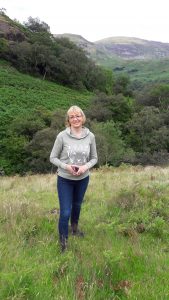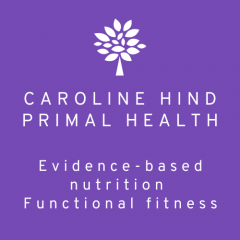 Caroline Hind
Caroline Hind
BA (Hons), PgDip Nutrition Science and Practice, mBANT, rCNHC
Clinical Nutritionist, Certified Primal Health Coach
Hi, I’m Caroline.
My journey to becoming a clinical nutritionist and certified health coach started in 2013 following my own health challenges. Changing my diet had unexpected and far-reaching effects on my health and led me to change many aspects of my lifestyle too. I trained as a Primal Health Coach and then went on to study nutrition science at postgraduate level with Middlesex University/NCA.
I am now a member of the teaching faculty at the NCA, specialising in research and the application of nutrition science to health and disease. In my private practice, I run nutrition programmes for schools and workplaces, write diet and lifestyle articles and see a small number of private patients.
I am delighted to be listed as a low-carb practitioner on the acclaimed Diet Doctor website – see my dietdoctor.com profile
My Philosophy
1. I believe that dietary changes can have huge effects on our health. It is easy to accept that a small tablet prescribed by a doctor can have a profound impact on the body. It can be harder to accept that the foods we eat can affect our health in major ways. It is also, of course, far more difficult to make dietary changes than it is to take a tablet. Personalised information is important, but support to make changes is key.
2. Food is the starting point and it's impossible to over-emphasise its effect on us, but the way we live is also hugely important. It is so easy to forget to keep our bodies moving and to find time to unwind.
3. "Primal" health is my starting point. Primal living is about considering what our bodies are designed to do, how we were perhaps meant to be living even though we now live in a very indoors-oriented, high-tech and fast-moving society. This is what I wrote when I first set up my nutrition coaching practice in 2017:
"I chose the 'primal' way of life because I fell in love with the simple things that I had forgotten since becoming an adult: feeling sunshine on my skin, daylight in my eyes, grass under my bare feet, the smells of the seasons, the challenge of balancing on kerbs and logs, the pleasures of good food, sleep, conversation, walks, relaxation, meditation, prayer, gratitude, living in a community. All of this, of course, underlined by feeling in good enough shape, fitness and health to enjoy it. Some of these simple principles can be of great use even for people with limited mobility."
These concepts are still very important to me and one of my greatest pleasures in my work is to troubleshoot ways to support people who face all kinds of challenges to re-find these simple things in life.
My longer primal health story
After my twins were born in 2005, when I was 40, I seemed to be slowly accumulating weight and generally slowing down. I was becoming the kind of mum who sits at the side of the ball pool and doesn’t quite have the energy to join in. I started having the odd migraine, something I hadn’t had since my teens, and it was slowly dawning on me that perhaps once we turn 40, we can’t carry on getting away with the same amount of crisps and chocolate bars….
Apart from my obvious indulgences, I thought I was generally eating healthily: lots of cereal bars, brown rice, brown pasta, muesli, huge fruit salads, home-cooked food that was increasingly vegetarian. I went through a bad case of pneumonia in 2007 — no doubt exacerbated by a stressful house move — and it spurred me on to put a stop to my cake and chocolate habit.
I was clearly ready to change and I set myself a rule of no sugary desserts. I’ve always enjoyed food and I took to eating yogurt and oatcakes in the evening instead of chocolate. Slowly, slowly, the weight started to come off — it was hardly perceptible month to month, but it definitely started to show after several months on my new regime.
 So far so good. But then, in 2013, I was diagnosed with, among other things, inflammatory bowel disease (IBD). I was confused about what I should be eating: I was a fan of ‘healthy whole grains’ and yet I was now being advised to reduce fibre, eat white bread, and take Crohn’s disease medication. The hospital consultants were very supportive of the idea of managing the condition through diet. The problem was: which diet?
So far so good. But then, in 2013, I was diagnosed with, among other things, inflammatory bowel disease (IBD). I was confused about what I should be eating: I was a fan of ‘healthy whole grains’ and yet I was now being advised to reduce fibre, eat white bread, and take Crohn’s disease medication. The hospital consultants were very supportive of the idea of managing the condition through diet. The problem was: which diet?
I was doomed to spend hours going down the various dietary rabbit holes of the internet. Luckily a very insightful friend introduced me to the Whole 30, a sort of 30-day challenge to eat lower-sugar, unprocessed foods. As I’d already stopped eating desserts and chocolate bars, I couldn’t really imagine what that meant. But as the Whole 30 seemed to have worked for my friend, and it looked like a very simple way of eating. we decided to try it out as a family.
I can’t say it was as simple as it looked — the foods are indeed simple but after years of high-fibre and ‘convenience’ foods, we had to completely re-think which foods are healthy and which foods are not. All the cereals, pastas, frozen pizzas, rice and bread had to go. Breakfast needed a complete re-think. It felt more like the way my grandparents used to eat: meat and three veg, cooked breakfasts, proper meals with fewer snacks.
I felt better within three days.
I suddenly realised that my abdomen felt different, less heavy, not bloated. The funny thing was, I had not known it was bloated before. I was now determined to carry on learning about this ‘new’ way of eating. Feeling more energetic, thinner and generally more optimistic, I was happy to spend that bit of extra time planning meals, shopping more carefully and cooking from scratch.
One day I walked into our local library cafe and found Mark Sisson’s book, ‘The Primal Blueprint’. The book talks about the disconnect between the way we live now – sedentary, stressed, indoors and dependent on sugary processed foods – and the way our bodies probably evolved to live over the millennia – moving; lifting things; balancing rest, sleep and relaxation; being outdoors; and running on nutrient-dense, low-sugar foods. It was my light-bulb moment.
 Those high-fibre ‘healthy whole grains’ I’d been living on were revealed as chains of glucose molecules with the potential to disrupt blood sugar balance, much poorer in nutrients than I had thought, and bringing with them various elements that were exacerbating my IBD. My indoor life – so far away from my more outdoorsy childhood – was lacking in sunshine, fresh air, nature, movement and anything else that builds strong, resilient bodies.
Those high-fibre ‘healthy whole grains’ I’d been living on were revealed as chains of glucose molecules with the potential to disrupt blood sugar balance, much poorer in nutrients than I had thought, and bringing with them various elements that were exacerbating my IBD. My indoor life – so far away from my more outdoorsy childhood – was lacking in sunshine, fresh air, nature, movement and anything else that builds strong, resilient bodies.
The Whole 30 was just the start of a whole world of primal eating and living. I love food and Mark Sisson’s exhortation to take the time to cook and enjoy meals chimed well with me. I am still not an enthusiastic cook but I woke up to the pleasures of good, traditional foods and started to realise the limitations of over-flavoured, factory-cooked, industrial-oil-laden, sugar-heavy foods.
And this joy in food extended to a new-found joy in the natural delights of the world that many of us are lucky to be able to access but which we constantly ignore: simply getting outdoors, walking on soft grass or sand in bare feet, enjoying the warmth of the sun, taking a stroll, breathing in the air of the sea, the countryside or the woods.

Simply moving more every day and sometimes choosing the harder options — parking further from the supermarket door, sitting on the floor, walking to do local errands, breaking up sitting with some simple exercises – all of these bring the freedom of being flexible and fit enough to walk or dance or swim or cycle or pick up our growing children or grandchildren. As a child and teen and young person, I took fitness and flexibility for granted. When did I lose it? What made me slow down without even knowing it?
Thanks to Mark Sisson’s Primal Blueprint and free articles on his website: www.marksdailyapple.com, I gradually started to try out some basic primal movements, invented ways to walk more, and realised that you’re never too old or out of practice to improve your balance, strength and flexibility.
A friend of mine always used to carry my suitcases as I was so weak; now I go out of my way to lift things and test my strength. I might have lost health and fitness on my way into middle age but I’m going through, and hopefully beyond, middle age with a much better chance of staying healthy and mobile and with a much deeper appreciation of the simple delights that are ours for the taking.
to lift things and test my strength. I might have lost health and fitness on my way into middle age but I’m going through, and hopefully beyond, middle age with a much better chance of staying healthy and mobile and with a much deeper appreciation of the simple delights that are ours for the taking.
With renewed energy and a refreshed mind, I was able to change direction career-wise and study to become a health coach, learning how to support others as they work towards their own health/fitness/vitality goals. It then became apparent that I also wanted to offer more specialised help to those facing specific health challenges. I chose a college with a renowned teaching clinic – NCA in York– and gained my postgraduate qualification in Nutrition Science and Practice.
I am now a lecturer at the same college, working on their new BSC (Hons) in Personalised Nutrition.
If you wish to learn more about low-carb nutrition, the Diet Doctor website is a good place to start.
You can also find out more about the low-carb for diabetes programs that colleagues and I support on a volunteer basis via The Public Health Collaboration.
